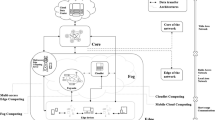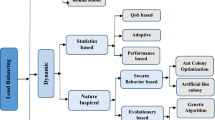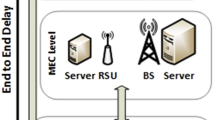Abstract
Cooperative computation offloading (CCO) is a technique to improve computation offloading performance in edge networks through collaboration between edge nodes. CCO can achieve better resource utilization, balance the computational load and further reduce delay to improve the service experience of user equipment (UE). In this paper, we investigate the problem of collaborative computing task offloading scheme and computing resource allocation in mobile edge computing and propose a data compression cooperation computing offloading (DCCO) scheme. To reduce the amount of data transmitted on the UE offloading link, we introduce a Data Compression into CCO and present the computational offloading strategy, collaborative offloading and computational resource allocation problems with the goal of minimizing the weighted sum of delay and energy consumption of the UE under the constraints of UE delay and energy consumption. And an improved genetic algorithm is proposed to solve the problem which is a non-convex mixed-integer problem with binary and continuous variables. The offloading strategy and computational resource allocation correspond to the genes in the genetic algorithm chromosome. The simulation results show that the DCCO scheme can reduce the offloading cost up to 11% compared with the existing schemes. It effectively improves the computation offloading performance of edge network computing.






Similar content being viewed by others
Availability of data and materials
The datasets generated during the current study are available from the corresponding author on reasonable request.
References
Ren J, Yu G, Cai Y, He Y (2018) Latency optimization for resource allocation in mobile-edge computation offloading. IEEE Trans Wireless Commun 17(8):5506–5519
Bozorgchenani A, Mashhadi F, Tarchi D, Monroy SAS (2020) Multi-objective computation sharing in energy and delay constrained mobile edge computing environments. IEEE Trans Mobile Comput 20(10):2992–3005
Wang X, Han Y, Leung VC, Niyato D, Yan X, Chen X (2020) Convergence of edge computing and deep learning: a comprehensive survey. IEEE Commun Surv Tutorials 22(2):869–904
Kuang Z, Li L, Gao J, Zhao L, Liu A (2019) Partial offloading scheduling and power allocation for mobile edge computing systems. IEEE Internet Things J 6(4):6774–6785
Dai H, Zeng X, Yu Z, Wang T (2019) A scheduling algorithm for autonomous driving tasks on mobile edge computing servers. J Syst Arch 94:14–23
Wu H, Deng S, Li W, Yin J, Li X, Feng Z, Zomaya AY (2019) Mobility-aware service selection in mobile edge computing systems. In: 2019 IEEE International Cconference on Web Services (ICWS), pp 201–208 (2019). IEEE
Fang F, Xu Y, Ding Z, Shen C, Peng M, Karagiannidis GK (2020) Optimal resource allocation for delay minimization in noma-mec networks. IEEE Trans Commun 68(12):7867–7881
Pan Y, Chen M, Yang Z, Huang N, Shikh-Bahaei M (2018) Energy-efficient noma-based mobile edge computing offloading. IEEE Commun Lett 23(2):310–313
Guo M, Li Q, Peng Z, Liu X, Cui D (2022) Energy harvesting computation offloading game towards minimizing delay for mobile edge computing. Comput Netw 204:108678
Liu J, Mao Y, Zhang J, Letaief K.B (2016) Delay-optimal computation task scheduling for mobile-edge computing systems. In: 2016 IEEE International Symposium on Information Theory (ISIT), pp 1451–1455. IEEE
Wei F, Chen S, Zou W (2018) A greedy algorithm for task offloading in mobile edge computing system. China Commun 15(11):149–157
Li Y, Wang T, Wu Y, Jia W (2022) Optimal dynamic spectrum allocation-assisted latency minimization for multiuser mobile edge computing. Digital Commun Netw 8(3):247–256
Yang Y, Wang Y, Wang R, Chu S (2018) A resource allocation method based on the core server in the collaborative space for mobile edge computing. In: 2018 IEEE/CIC International Conference on Communications in China (ICCC), pp 568–572. IEEE
Li Q, Shao H (2021) Cooperative resource allocation for computation offloading in mobile-edge computing networks. In: 2021 IEEE Wireless Communications and Networking Conference (WCNC), pp 1–6. IEEE
Nguyen P.-D, Ha V.N, Le L.B (2019) Computation offloading and resource allocation for backhaul limited cooperative mec systems. In: 2019 IEEE 90th Vehicular Technology Conference (VTC2019-Fall), pp 1–6. IEEE
Chen M-H, Dong M, Liang B (2018) Resource sharing of a computing access point for multi-user mobile cloud offloading with delay constraints. IEEE Trans Mobile Comput 17(12):2868–2881
Ning Z, Dong P, Kong X, Xia F (2018) A cooperative partial computation offloading scheme for mobile edge computing enabled internet of things. IEEE Internet Things J 6(3):4804–4814
Ning Z, Dong P, Wang X, Guo L, Rodrigues JJ, Kong X, Huang J, Kwok RY (2019) Deep reinforcement learning for intelligent internet of vehicles: an energy-efficient computational offloading scheme. IEEE Trans Cognit Commun Netw 5(4):1060–1072
Du J, Zhao L, Feng J, Chu X (2017) Computation offloading and resource allocation in mixed fog/cloud computing systems with min-max fairness guarantee. IEEE Trans Commun 66(4):1594–1608
Zhang W, Wen Y, Zhang Y.J, Liu F, Fan R (2017) Mobile cloud computing with voltage scaling and data compression. In: 2017 IEEE 18th International Workshop on Signal Processing Advances in Wireless Communications (SPAWC), pp 1–5. IEEE
Wang Q, Guo S, Liu J, Pan C, Yang L (2022) Profit maximization incentive mechanism for resource providers in mobile edge computing. IEEE Trans Serv Comput 15(1):138–149. https://doi.org/10.1109/TSC.2019.2924002
Jayanetti A, Halgamuge S, Buyya R (2022) Deep reinforcement learning for energy and time optimized scheduling of precedence-constrained tasks in edge-cloud computing environments. Future Generation Comput Syst 137:14–30. https://doi.org/10.1016/j.future.2022.06.012
Dong J, Song C, Zhang T, Li Y, Zheng H (2022) Integration of edge computing and blockchain for provision of data fusion and secure big data analysis for internet of things. Wireless Commun Mobile Comput 2022. https://doi.org/10.1155/2022/9233267
Ren J, Yu G, Cai Y, He Y, Qu F (2017) Partial offloading for latency minimization in mobile-edge computing. In: GLOBECOM 2017-2017 IEEE Global Communications Conference, pp 1–6. IEEE
Nguyen TT, Ha VN, Le LB, Schober R (2019) Joint data compression and computation offloading in hierarchical fog-cloud systems. IEEE Trans Wireless Commun 19(1):293–309
Dong J, Fu D, Zheng Z, Liu Z, Gao Y, Gui J (2020) Data compression method based on operation condition identification, pp 1–4 . https://doi.org/10.1109/ICECCE49384.2020.9179444
Holland J.H (1992) Adaptation in natural and artificial systems: an introductory analysis with applications to biology, control, and artificial intelligence. MIT press
Slowik A, Kwasnicka H (2020) Evolutionary algorithms and their applications to engineering problems. Neural Comput Appl 32(16):12363–12379
Acknowledgements
This work was supported by the Chongqing science and Technology Commission Project (Grant No: cstc2018jcyjAX0525) and the Key Research and Development Projects of Sichuan Science and Technology Department (Grant No: 2019YFG0107).
Funding
This work was supported by the Chongqing science and Technology Commission Project (Grant No: cstc2018jcyjAX0525; Recipient: Hongjian Li) and the Key Research and Development Projects of Sichuan Science and Technology Department (Grant No: 2019YFG0107; Recipient: Hongjian Li).
Author information
Authors and Affiliations
Contributions
HL and DL proposed an idea, carried out the experiments and wrote the manuscript. XZ and HS helped to write several sections of the manuscript and did proofreading.
Corresponding author
Ethics declarations
Conflict of interest
None. The authors declare that they have no known conflict financial interests or personal relationships that could have appeared to influence the work reported in this paper.
Ethics approval and consent to participate
Not applicable.
Consent for publication
Not applicable.
Additional information
Publisher's Note
Springer Nature remains neutral with regard to jurisdictional claims in published maps and institutional affiliations.
Rights and permissions
Springer Nature or its licensor (e.g. a society or other partner) holds exclusive rights to this article under a publishing agreement with the author(s) or other rightsholder(s); author self-archiving of the accepted manuscript version of this article is solely governed by the terms of such publishing agreement and applicable law.
About this article
Cite this article
Li, H., Li, D., Zhang, X. et al. Cooperative computation offloading combined with data compression in mobile edge computing system. J Supercomput 79, 13490–13518 (2023). https://doi.org/10.1007/s11227-023-05200-8
Accepted:
Published:
Issue Date:
DOI: https://doi.org/10.1007/s11227-023-05200-8




